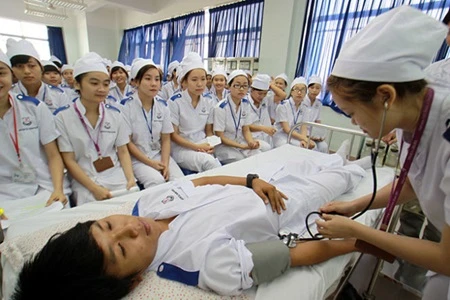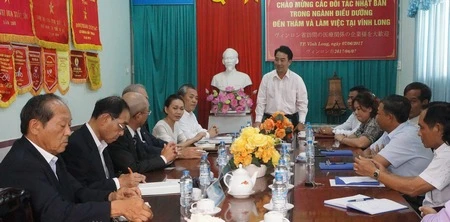Berlin (VNA) – A pilot project of Germany on training Vietnamese nurses has proved effective, as heard a seminar reviewing the project recently held by the German Federal Ministry for Economic Affairs and Energy in Berlin.
Conducted by the German Development Cooperation Agency (GIZ), the project has trained 200 Vietnamese nurses since 2012, over half of them have completed the course and received working permits in Germany.
Over 95 percent of German training establishments involved in the training programme spoke highly of Vietnamese trainees’ diligence and expressed wish to welcome more from Vietnam.
As Germany is facing rapid population aging, its government set the target of training and recruiting 8,000 – 13,000 nurses between now and 2021 at home or those from the third countries, including Vietnam.
Minister Counsellor at the Vietnamese Embasssy in Germany Nguyen Huu Trang highlighted cooperation opportunities between Vietnam and Germany, especially in labour training and exchange.
According to him, Vietnam now has a golden population structure with over 63 million people in working age, or 68.7 percent of the population.
During their Vietnam visits this year, leaders of German states of Hamburg, Bremen, Rheinland Pflaz and Mecklenburg Vorpommern proposed boosting labour and vocational training cooperation with Vietnam, including training nurses.
Trang took the occasion to ask Germany to simplify immigration procedures, especially for Vietnamese trainees.
Vietnam now has agreements on training and employment of skilled workers with over 10 countries and territories, including Japan, the Republic of Korea, New Zealand, Taiwan (China), Australia, Belgium.
More than 53,000 Vietnamese workers are working in 37 countries and territories worldwide.-VNA
Conducted by the German Development Cooperation Agency (GIZ), the project has trained 200 Vietnamese nurses since 2012, over half of them have completed the course and received working permits in Germany.
Over 95 percent of German training establishments involved in the training programme spoke highly of Vietnamese trainees’ diligence and expressed wish to welcome more from Vietnam.
As Germany is facing rapid population aging, its government set the target of training and recruiting 8,000 – 13,000 nurses between now and 2021 at home or those from the third countries, including Vietnam.
Minister Counsellor at the Vietnamese Embasssy in Germany Nguyen Huu Trang highlighted cooperation opportunities between Vietnam and Germany, especially in labour training and exchange.
According to him, Vietnam now has a golden population structure with over 63 million people in working age, or 68.7 percent of the population.
During their Vietnam visits this year, leaders of German states of Hamburg, Bremen, Rheinland Pflaz and Mecklenburg Vorpommern proposed boosting labour and vocational training cooperation with Vietnam, including training nurses.
Trang took the occasion to ask Germany to simplify immigration procedures, especially for Vietnamese trainees.
Vietnam now has agreements on training and employment of skilled workers with over 10 countries and territories, including Japan, the Republic of Korea, New Zealand, Taiwan (China), Australia, Belgium.
More than 53,000 Vietnamese workers are working in 37 countries and territories worldwide.-VNA
VNA























